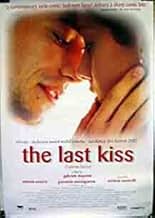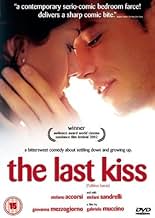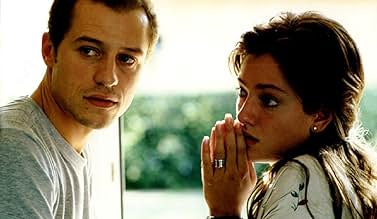IMDb-BEWERTUNG
6,9/10
8974
IHRE BEWERTUNG
Füge eine Handlung in deiner Sprache hinzuCarlo's life is thrown into a tailspin when his longtime girlfriend Giulia announces she's pregnant. As Carlo faces up to his anxieties about adulthood, his buddies Paolo, Adriano and Albert... Alles lesenCarlo's life is thrown into a tailspin when his longtime girlfriend Giulia announces she's pregnant. As Carlo faces up to his anxieties about adulthood, his buddies Paolo, Adriano and Alberto reluctantly grapple with their own responsibilities.Carlo's life is thrown into a tailspin when his longtime girlfriend Giulia announces she's pregnant. As Carlo faces up to his anxieties about adulthood, his buddies Paolo, Adriano and Alberto reluctantly grapple with their own responsibilities.
- Auszeichnungen
- 16 Gewinne & 14 Nominierungen insgesamt
Pierfrancesco Favino
- Marco
- (as Pier Francesco Favino)
Empfohlene Bewertungen
This was acclaimed as one of the 'masterpieces' of last year's Italian cinema. I do not think so. It's true that it is a realistic and honest portrait of generation X in Italy, with all their (our) contradictions, feelings, dreams and lifestyles, but the movie in itself is just nice, not good. Acting is reduced to shouting, running around, launching mobile phones and shouting again, nearly every time there is a conversation background music starts (that might be the reason why they scream that much!), and as in most Italian movies locations are quite improbable. A special mention goes to Martina Stella - really great, and the only character absolutely worth saving in the whole movie, and Sabrina Impacciatore - she really put her heart in this role !
I have seen this movie yesterday and I was really shaken by it - it is a very nicely made movie with nice pictures, lovely actors/actresses and surroundings. The key fact is that the content is really realistic and it is a movie where you will find your own past or future concerning "modern" relationships, because nearly everybody has gone trough the same experiences in one way or the other. This is what i find so amazing about this movie. He was able to draw pictures of emotions/situations and all people who watches the movie have the feeling that their own story has been told. Young girl being "used" as escape by a slightly older guy - Problems in a relationship because of pregnancy and the fear that life will alter significantly - problems in relationship because a young mother struggles more with baby than take care of anything else , or just being 50 and looking back on the past, realizing that love has gone -
The generation of 30-year-old is under study in Italy nowadays. Between jobs, high rents, low salaries, prefer stay with their parents and not getting married. But they also give the impression they reject responsibility and adult life (fancy the French film "Tanguy" was drawn from an Italian law case!). Check out "I laureati" by Leonardo Pieraccioni to find a film with a similar subject.
But there is not only the 30-year-old crisis, there is also a 50-year-old crisis shown in the film. Which enlarges the focus of the picture to love life and commitment in general. Love is shown in its "mortality". It ends. Family life is disappointing and suffocating, for the 30-year-old just as for the 50. The temptation of escaping is great.
But it may be too late. Or you don't have courage enough. Or it is not really what you want. Then staying at home and resigning oneself seems to be the next best thing, but the only available one. Is this happiness? I don't know. Someone may be satisfied with the "happy end" where every thing is put together, but I personally retained a feeling of uncomfortableness. Pay attention to the very last moments of the film. The "we reap as we sow" message.
Actors: I loved Stefania Sandrelli, courageous and ironic enough to let the director film her CLOSE and show all the wrinkles, the years that have passed by. She is credible and expressive. I also love Sergio Castellito, always great. Martina Stella is very "fresh" and also credible in her role. What I really could not stand are Stefano Accorsi and Giovanna Mezzogiorno!!! I don't know if it is a personal dislike, for Accorsi it may be since I hate him in almost all the films he makes, instead I liked Giovanna Mezzogiorno very much in "La finestra di fronte". But the way they acted here, always panting, this jarring repetition of "huh-huh-huh". I've read comments here wondering if this behavior is "normal". No, in my (Italian) opinion it sounds fake.
In conclusion, I advise you not to watch this film if you are planning your wedding.
But there is not only the 30-year-old crisis, there is also a 50-year-old crisis shown in the film. Which enlarges the focus of the picture to love life and commitment in general. Love is shown in its "mortality". It ends. Family life is disappointing and suffocating, for the 30-year-old just as for the 50. The temptation of escaping is great.
But it may be too late. Or you don't have courage enough. Or it is not really what you want. Then staying at home and resigning oneself seems to be the next best thing, but the only available one. Is this happiness? I don't know. Someone may be satisfied with the "happy end" where every thing is put together, but I personally retained a feeling of uncomfortableness. Pay attention to the very last moments of the film. The "we reap as we sow" message.
Actors: I loved Stefania Sandrelli, courageous and ironic enough to let the director film her CLOSE and show all the wrinkles, the years that have passed by. She is credible and expressive. I also love Sergio Castellito, always great. Martina Stella is very "fresh" and also credible in her role. What I really could not stand are Stefano Accorsi and Giovanna Mezzogiorno!!! I don't know if it is a personal dislike, for Accorsi it may be since I hate him in almost all the films he makes, instead I liked Giovanna Mezzogiorno very much in "La finestra di fronte". But the way they acted here, always panting, this jarring repetition of "huh-huh-huh". I've read comments here wondering if this behavior is "normal". No, in my (Italian) opinion it sounds fake.
In conclusion, I advise you not to watch this film if you are planning your wedding.
[s p o i l e r s]
You have to admit there's much that's life affirming and technically accomplished in Gabriele Muccino's movies about superficial Italians coupling and uncoupling. His scenes never stop moving, and his camera has learned to keep up with the flow. Undoubtedly his most polished effort so far is L'ultimo bacio (The Last Kiss). A box office success in Italy and abroad (though not a critical one), The Last Kiss is a splendid operatic swirl of melodramatic ensemble acting and liquid editing. Its succession of slick, fast-talking, emotional roller coaster scenes is a beautiful thing to watch. It's got irresistible rhythm if you don't mind that the high energy leads to an awful lot of yelling. The episodic structure and musical links may owe something to P.T. Anderson's Magnolia; but this is Italy and it all works differently. It isn't about anomie and chance encounters: everyone's connected. The Last Kiss is a well-oiled machine with jaw-dropping energy.
Its action is so lively, its motion so perpetual, you may fail to notice what a stagnant society The Last Kiss represents - how complacent the characters and their creator are. The way they buckle down and accept the mind-numbing `comforts' and intellectual limitations of Berlusconi's Italy. It's a place they all seem destined to accept as the best of all possible worlds.
The Last Kiss revolves (almost literally: the steadicam pans from scene to scene while operatic music swims across the transitions) around five young men about to turn thirty in a provincial town. At the center is Carlo (Stefano Accorsi). His fiancée Giulia (Giovanna Mezzogiorno) is pregnant and he can't face the prospect of a wife, a child, and a house. He's not ready to grow up. Most of Carlo's buddies have the same problem. Paolo (Claudio Santamaria) goes through the death of his father right after he's had an angry breakup with his girlfriend, and he can't face going into the family religious object business. The mercurial Adriano (Giorgio Casotti) has a young child and a ball-buster wife (Livia, Sabrina Impacciatore) and these challenges have him fed up with his marriage and ready to leave it. Alberto (Marco Cocci), a dreadlocked, joint-smoking Greenpeace hippy, amuses himself seeing how many women will jump into bed with him; he's a sciupafemmine, a Don Juan who chews them up and spits them out: marriage is not on his horizon.
But Marco (Pierfrancesco Favino) is getting married: he's buying into the normal life. Marco's four friends are all at Marco's wedding, and it's there that Carlo meets Francesca (Martina Stella), a tantalizingly delicious blonde schoolgirl who successfully puts the make on him. Meanwhile Giulia's mother Anna (a simpatica Stefania Sandrelli) is fed up with her taciturn psychiatrist husband Emilio (Luigi Emilio) and goes through her own period of rebellion, trying to revive an affair of three years ago with a college professor (Sergio Castellitto).
Carlo gets his wild night with Francesca, his `last kiss' which turns into more than that after Giulia finds out and they have a big fight (where the movie's yell-fest reaches fortissimo). He runs back and sleeps with the 18-year old, and then spends the rest of the movie trying to patch things up and get his life back on its track. Meanwhile Adriano, Alberto, and Paolo are planning to run off to Africa, or somewhere-an escape that's really a last fling: but their whole series of tantrums and complaints are background noise, an obligato to the main themes. The focus is on Giulia's mother, Adriano, and Carlo. Where the movie is really headed for its finale is to Carlo and Giulia reuniting, and a soothing voiceover from Carlo about how nice it will be to have grass and a suburban house and kids. . .and all the rest, and the two of them are reconciled at her parents' house where Anna is back with her father. It seems that Adriano really has left his wife, for a while anyway, but that subject is dropped.
Closely examined, despite its Magnolia-like intercutting of related subplots, its splendid cast and beautiful look, The Last Kiss reveals a worldview that's numbingly vapid. Its young men on the verge of thirty and one older woman in revolt against the ordinary paths they've chosen only play at escape: the final sequence is a corny affirmation of comfortable bourgeois family life, big house, big car, perfect bambini. Anna is back with Giulia's father. Her little revolt is over.
What is the theme that unifies Muccino's movies? Is it coming of age, as in Come te nessuno mai, or is it playing at revolution, as in that same rather charming first film about high schoolers staging a Sixties-style strike while what the boys really want is only to get laid? If Come te is Muccino's freshest and most unassuming effort, Ricordati di me, his most recent one, is his cheesiest: again, a swirl of stories about individuals in a family who are all in revolt against their lives - and come back to conventionality at the end - but with much tackier subplots. He's made a trilogy: (1) first sex, (2) last infidelity before marriage, (3) first infidelity after, with being aTV go-go dancer treated as a viable life choice. The theme is simply: revolt a little, it'll make you feel better. `Normality is the true revolution.'
Italians who remember the great directors of the past shake their heads at such stuff. The idea that all temptations to rebel end in a little reconciliation is complacent even for TV sitcoms. It's as if Muccino has all this promise as a filmmaker - he can orchestrate his subplots in such an entertaining way and the editing is inspired - he's a real Robert Altman with a Tuscan accent - but his head is too empty; there's no there there.
Muccino's characters, for all their charm and good looks, are pretty silly people. Carlo, Last Kiss's main character, is attractive in his way but his shit-faced grin palls: he's an airhead to be tempted by Francesca, the blonde Lolita, because she's an airhead too, just a pretty schoolgirl who confuses wanting to get laid with finding the love of her life. There's no edge to the temptation, because Francesca's pull on Carlo was so superficial. It's lively and glossy and it has moments of flirting with satire and farce, the sheer energy of it can be lots of fun to watch, but when you get down to it, Last Kiss is on the level of a TV sitcom. In fact American cable network dramas arguably go deeper than this. Is Muccino the best that mainstream Italian cinema can now produce? Let's hope not.
You have to admit there's much that's life affirming and technically accomplished in Gabriele Muccino's movies about superficial Italians coupling and uncoupling. His scenes never stop moving, and his camera has learned to keep up with the flow. Undoubtedly his most polished effort so far is L'ultimo bacio (The Last Kiss). A box office success in Italy and abroad (though not a critical one), The Last Kiss is a splendid operatic swirl of melodramatic ensemble acting and liquid editing. Its succession of slick, fast-talking, emotional roller coaster scenes is a beautiful thing to watch. It's got irresistible rhythm if you don't mind that the high energy leads to an awful lot of yelling. The episodic structure and musical links may owe something to P.T. Anderson's Magnolia; but this is Italy and it all works differently. It isn't about anomie and chance encounters: everyone's connected. The Last Kiss is a well-oiled machine with jaw-dropping energy.
Its action is so lively, its motion so perpetual, you may fail to notice what a stagnant society The Last Kiss represents - how complacent the characters and their creator are. The way they buckle down and accept the mind-numbing `comforts' and intellectual limitations of Berlusconi's Italy. It's a place they all seem destined to accept as the best of all possible worlds.
The Last Kiss revolves (almost literally: the steadicam pans from scene to scene while operatic music swims across the transitions) around five young men about to turn thirty in a provincial town. At the center is Carlo (Stefano Accorsi). His fiancée Giulia (Giovanna Mezzogiorno) is pregnant and he can't face the prospect of a wife, a child, and a house. He's not ready to grow up. Most of Carlo's buddies have the same problem. Paolo (Claudio Santamaria) goes through the death of his father right after he's had an angry breakup with his girlfriend, and he can't face going into the family religious object business. The mercurial Adriano (Giorgio Casotti) has a young child and a ball-buster wife (Livia, Sabrina Impacciatore) and these challenges have him fed up with his marriage and ready to leave it. Alberto (Marco Cocci), a dreadlocked, joint-smoking Greenpeace hippy, amuses himself seeing how many women will jump into bed with him; he's a sciupafemmine, a Don Juan who chews them up and spits them out: marriage is not on his horizon.
But Marco (Pierfrancesco Favino) is getting married: he's buying into the normal life. Marco's four friends are all at Marco's wedding, and it's there that Carlo meets Francesca (Martina Stella), a tantalizingly delicious blonde schoolgirl who successfully puts the make on him. Meanwhile Giulia's mother Anna (a simpatica Stefania Sandrelli) is fed up with her taciturn psychiatrist husband Emilio (Luigi Emilio) and goes through her own period of rebellion, trying to revive an affair of three years ago with a college professor (Sergio Castellitto).
Carlo gets his wild night with Francesca, his `last kiss' which turns into more than that after Giulia finds out and they have a big fight (where the movie's yell-fest reaches fortissimo). He runs back and sleeps with the 18-year old, and then spends the rest of the movie trying to patch things up and get his life back on its track. Meanwhile Adriano, Alberto, and Paolo are planning to run off to Africa, or somewhere-an escape that's really a last fling: but their whole series of tantrums and complaints are background noise, an obligato to the main themes. The focus is on Giulia's mother, Adriano, and Carlo. Where the movie is really headed for its finale is to Carlo and Giulia reuniting, and a soothing voiceover from Carlo about how nice it will be to have grass and a suburban house and kids. . .and all the rest, and the two of them are reconciled at her parents' house where Anna is back with her father. It seems that Adriano really has left his wife, for a while anyway, but that subject is dropped.
Closely examined, despite its Magnolia-like intercutting of related subplots, its splendid cast and beautiful look, The Last Kiss reveals a worldview that's numbingly vapid. Its young men on the verge of thirty and one older woman in revolt against the ordinary paths they've chosen only play at escape: the final sequence is a corny affirmation of comfortable bourgeois family life, big house, big car, perfect bambini. Anna is back with Giulia's father. Her little revolt is over.
What is the theme that unifies Muccino's movies? Is it coming of age, as in Come te nessuno mai, or is it playing at revolution, as in that same rather charming first film about high schoolers staging a Sixties-style strike while what the boys really want is only to get laid? If Come te is Muccino's freshest and most unassuming effort, Ricordati di me, his most recent one, is his cheesiest: again, a swirl of stories about individuals in a family who are all in revolt against their lives - and come back to conventionality at the end - but with much tackier subplots. He's made a trilogy: (1) first sex, (2) last infidelity before marriage, (3) first infidelity after, with being aTV go-go dancer treated as a viable life choice. The theme is simply: revolt a little, it'll make you feel better. `Normality is the true revolution.'
Italians who remember the great directors of the past shake their heads at such stuff. The idea that all temptations to rebel end in a little reconciliation is complacent even for TV sitcoms. It's as if Muccino has all this promise as a filmmaker - he can orchestrate his subplots in such an entertaining way and the editing is inspired - he's a real Robert Altman with a Tuscan accent - but his head is too empty; there's no there there.
Muccino's characters, for all their charm and good looks, are pretty silly people. Carlo, Last Kiss's main character, is attractive in his way but his shit-faced grin palls: he's an airhead to be tempted by Francesca, the blonde Lolita, because she's an airhead too, just a pretty schoolgirl who confuses wanting to get laid with finding the love of her life. There's no edge to the temptation, because Francesca's pull on Carlo was so superficial. It's lively and glossy and it has moments of flirting with satire and farce, the sheer energy of it can be lots of fun to watch, but when you get down to it, Last Kiss is on the level of a TV sitcom. In fact American cable network dramas arguably go deeper than this. Is Muccino the best that mainstream Italian cinema can now produce? Let's hope not.
Carlos (Stefano Accorsi) is a twenty-nine years old man, who works in an advertisement agency and has been living with his girlfriend Giulia (Giovanna Mezzogiorno) for three years. When she gets pregnant and he meets the delicious eighteen years old Francesca (Martina Stella), his relationship with Giulia have a crisis, since he is not ready to reach adulthood. Francesca has a crush and dreams on Carlos. His three best friends have also problems with their mates: Adriano (Giorgio Pasotti) has just had a son and has problems to take the responsibilities of the fatherhood, while his wife Livia (Sabrina Impacciatory) becomes very connected to the baby, neglecting their marriage; Alberto (Marco Cocci) has no ties with any woman, limiting to use them sexually; and Paolo (Claudio Santamaria) has a passion for his former lover. Meanwhile, Giulia's mother, Anna Stefania Sandrelli), has a middle-age crisis, jeopardizing her marriage. "L'Ultimo Bacio" is a beautiful and delightful movie about relationship in different phases of life. The story is very intelligent and realistic, reaching characters of different ages to show the crisis that most of the persons pass along their lives in their relationship with their mates. Whose teenager has never had a passion for a man or woman, like the character of Francesca? And the doubts and insecurity about fatherhood or motherhood, like Carlos, Giulia, Adriano and Livia? And the love jealousy, like Paolo? And the middle age crisis, like Anna? Therefore, the story certainly catch a phase in the life of the viewer himself or herself, and he or she will certainly identify the situation of a character as his or her own. The beauties of Giovanna Mezzogiorno, with her magnificent blue eyes, and Martina Stella, with her wonderful body and look, are another attraction in this lovely and highly recommended movie. My vote is nine.
Title (Brazil): "O Último Beijo" ("The Last Kiss")
Title (Brazil): "O Último Beijo" ("The Last Kiss")
Wusstest du schon
- WissenswertesItalian censorship visa # 95133 delivered on 1 February 2001.
- VerbindungenFollowed by Baciami ancora (2010)
Top-Auswahl
Melde dich zum Bewerten an und greife auf die Watchlist für personalisierte Empfehlungen zu.
- How long is The Last Kiss?Powered by Alexa
Details
Box Office
- Bruttoertrag in den USA und Kanada
- 1.048.950 $
- Eröffnungswochenende in den USA und in Kanada
- 33.561 $
- 18. Aug. 2002
- Weltweiter Bruttoertrag
- 17.784.993 $
- Laufzeit1 Stunde 55 Minuten
- Sound-Mix
- Seitenverhältnis
- 2.35 : 1
Zu dieser Seite beitragen
Bearbeitung vorschlagen oder fehlenden Inhalt hinzufügen


































